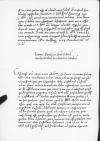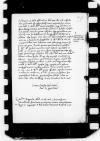Generose Domine, amice unice carissime.
Salutem et omnem felicitatem.
Has tumultuario ad Dominationem Vestram calamo perscripsi non solum, ut cf. Mikołaj GRABIA to Ioannes DANTISCUS Vilnius, 1540-10-15 — 1540-10-17, CIDTC IDL 7399, letter lost⌊novissimiscf. Mikołaj GRABIA to Ioannes DANTISCUS Vilnius, 1540-10-15 — 1540-10-17, CIDTC IDL 7399, letter lost⌋, quas per generosum dominum Achatius von Zehmen (Achacy Cema) (*ca. 1485 – †1565), 1517-1531 Chamberlain of Pomerania, 1531-1546 Castellan of Gdańsk (Danzig), 1545-1546 Voivode of Kulm (Chełmno), 1546-1565 Voivode of Marienburg (Malbork) (SBPN 1, p. 194-195; ORACKI 1984, p. 38-39; Urzędnicy 5/2, p. 198; PSB 4, p. 325-326)⌊castellanum GdanensemAchatius von Zehmen (Achacy Cema) (*ca. 1485 – †1565), 1517-1531 Chamberlain of Pomerania, 1531-1546 Castellan of Gdańsk (Danzig), 1545-1546 Voivode of Kulm (Chełmno), 1546-1565 Voivode of Marienburg (Malbork) (SBPN 1, p. 194-195; ORACKI 1984, p. 38-39; Urzędnicy 5/2, p. 198; PSB 4, p. 325-326)⌋ ad me plenas veteris benevolentiae dedit, responderem, verum etiam, ut illi afflictionem meam, quae iterum in me per clandestinos quosdam quadruplatores congeritur, in sinum Dominationis Vestrae profunderem.
Priusquam Achatius von Zehmen (Achacy Cema) (*ca. 1485 – †1565), 1517-1531 Chamberlain of Pomerania, 1531-1546 Castellan of Gdańsk (Danzig), 1545-1546 Voivode of Kulm (Chełmno), 1546-1565 Voivode of Marienburg (Malbork) (SBPN 1, p. 194-195; ORACKI 1984, p. 38-39; Urzędnicy 5/2, p. 198; PSB 4, p. 325-326)⌊dominus castellanusAchatius von Zehmen (Achacy Cema) (*ca. 1485 – †1565), 1517-1531 Chamberlain of Pomerania, 1531-1546 Castellan of Gdańsk (Danzig), 1545-1546 Voivode of Kulm (Chełmno), 1546-1565 Voivode of Marienburg (Malbork) (SBPN 1, p. 194-195; ORACKI 1984, p. 38-39; Urzędnicy 5/2, p. 198; PSB 4, p. 325-326)⌋ ad aulam proficisceretur, rumore quodam ad me fuit perlatum, quod iterum apud serenissimam Bona Sforza (*1494 – †1557), Queen of Poland and Grand Duchess of Lithuania (1518-1557); the second wife of Sigismund I Jagiellon; Duchess of Bari and Rossano; daughter of Gian Galeazzo Sforza of Milan and Isabella of Aragon⌊maiestatem reginalemBona Sforza (*1494 – †1557), Queen of Poland and Grand Duchess of Lithuania (1518-1557); the second wife of Sigismund I Jagiellon; Duchess of Bari and Rossano; daughter of Gian Galeazzo Sforza of Milan and Isabella of Aragon⌋ traductus essem, quasi cum certis hic dominis consiliariis, praecipue vero cum Gdańsk Town Council ⌊magistratu GdanensiGdańsk Town Council ⌋, defectionem pararem et conspirationem ad hoc facinus fecerim. Quod, ut crederem, induci non potui confictumque esse existimabam, quo factum est, quod ne verbo quidem huius delationis, quam commentitiam esse putabam, mentionem cum domino Achatius von Zehmen (Achacy Cema) (*ca. 1485 – †1565), 1517-1531 Chamberlain of Pomerania, 1531-1546 Castellan of Gdańsk (Danzig), 1545-1546 Voivode of Kulm (Chełmno), 1546-1565 Voivode of Marienburg (Malbork) (SBPN 1, p. 194-195; ORACKI 1984, p. 38-39; Urzędnicy 5/2, p. 198; PSB 4, p. 325-326)⌊castellanoAchatius von Zehmen (Achacy Cema) (*ca. 1485 – †1565), 1517-1531 Chamberlain of Pomerania, 1531-1546 Castellan of Gdańsk (Danzig), 1545-1546 Voivode of Kulm (Chełmno), 1546-1565 Voivode of Marienburg (Malbork) (SBPN 1, p. 194-195; ORACKI 1984, p. 38-39; Urzędnicy 5/2, p. 198; PSB 4, p. 325-326)⌋ habuerim, et ob id ea de re nihil vel significandum vel scribendum ad aulam duxerim.  BJ, 6657, f. 393r Lectis porro serenissimae Bona Sforza (*1494 – †1557), Queen of Poland and Grand Duchess of Lithuania (1518-1557); the second wife of Sigismund I Jagiellon; Duchess of Bari and Rossano; daughter of Gian Galeazzo Sforza of Milan and Isabella of Aragon⌊reginalis maiestatisBona Sforza (*1494 – †1557), Queen of Poland and Grand Duchess of Lithuania (1518-1557); the second wife of Sigismund I Jagiellon; Duchess of Bari and Rossano; daughter of Gian Galeazzo Sforza of Milan and Isabella of Aragon⌋ ad me cf. Bona Sforza to Ioannes DANTISCUS Vilnius, 1540-11-16, CIDTC IDL 2355⌊litteriscf. Bona Sforza to Ioannes DANTISCUS Vilnius, 1540-11-16, CIDTC IDL 2355⌋, quas Achatius von Zehmen (Achacy Cema) (*ca. 1485 – †1565), 1517-1531 Chamberlain of Pomerania, 1531-1546 Castellan of Gdańsk (Danzig), 1545-1546 Voivode of Kulm (Chełmno), 1546-1565 Voivode of Marienburg (Malbork) (SBPN 1, p. 194-195; ORACKI 1984, p. 38-39; Urzędnicy 5/2, p. 198; PSB 4, p. 325-326)⌊illeAchatius von Zehmen (Achacy Cema) (*ca. 1485 – †1565), 1517-1531 Chamberlain of Pomerania, 1531-1546 Castellan of Gdańsk (Danzig), 1545-1546 Voivode of Kulm (Chełmno), 1546-1565 Voivode of Marienburg (Malbork) (SBPN 1, p. 194-195; ORACKI 1984, p. 38-39; Urzędnicy 5/2, p. 198; PSB 4, p. 325-326)⌋ mihi reddidit, idem quod vanum esse rebar, plusquam verum expertus sum. Ad eum enim modum serenissima Bona Sforza (*1494 – †1557), Queen of Poland and Grand Duchess of Lithuania (1518-1557); the second wife of Sigismund I Jagiellon; Duchess of Bari and Rossano; daughter of Gian Galeazzo Sforza of Milan and Isabella of Aragon⌊reginalis maiestasBona Sforza (*1494 – †1557), Queen of Poland and Grand Duchess of Lithuania (1518-1557); the second wife of Sigismund I Jagiellon; Duchess of Bari and Rossano; daughter of Gian Galeazzo Sforza of Milan and Isabella of Aragon⌋ mecum expostulat meque cohortatur, ut officio debitoque senatorio, quemadmodum ad bonum ac fidelem consiliarium pertinet, omnia hic gerere, consulere atque agere debeam, perinde ac si cras sim defecturus vel hucusque officio debitoque meo infideliter usus fuerim. Hinc clare mihi liquet, quod iterum eiusmodi contra me a fraudulentis impostoribus serenissimae Bona Sforza (*1494 – †1557), Queen of Poland and Grand Duchess of Lithuania (1518-1557); the second wife of Sigismund I Jagiellon; Duchess of Bari and Rossano; daughter of Gian Galeazzo Sforza of Milan and Isabella of Aragon⌊reginali maiestatiBona Sforza (*1494 – †1557), Queen of Poland and Grand Duchess of Lithuania (1518-1557); the second wife of Sigismund I Jagiellon; Duchess of Bari and Rossano; daughter of Gian Galeazzo Sforza of Milan and Isabella of Aragon⌋ insimulatio prolata sit, qualis fuit illa, cuius ratione on the margin⌈insimulatio prolata sit, qualis fuit illa, cuius rationeinsimulatio prolata sit, qualis fuit illa, cuius ratione on the margin⌉ Dominatio Vestra ad me superioribus annis Löbau (Lubawa, Lubavia), town in northern Poland, Kulm Land (Ziemia Chełmińska), ca. 67 km E of Graudenz (Grudziądz), the main seat of the bishops of Kulm (Chełmno)⌊LubaviamLöbau (Lubawa, Lubavia), town in northern Poland, Kulm Land (Ziemia Chełmińska), ca. 67 km E of Graudenz (Grudziądz), the main seat of the bishops of Kulm (Chełmno)⌋ venit, subvereorque, ne ex ea sit farina, qua prior.
BJ, 6657, f. 393r Lectis porro serenissimae Bona Sforza (*1494 – †1557), Queen of Poland and Grand Duchess of Lithuania (1518-1557); the second wife of Sigismund I Jagiellon; Duchess of Bari and Rossano; daughter of Gian Galeazzo Sforza of Milan and Isabella of Aragon⌊reginalis maiestatisBona Sforza (*1494 – †1557), Queen of Poland and Grand Duchess of Lithuania (1518-1557); the second wife of Sigismund I Jagiellon; Duchess of Bari and Rossano; daughter of Gian Galeazzo Sforza of Milan and Isabella of Aragon⌋ ad me cf. Bona Sforza to Ioannes DANTISCUS Vilnius, 1540-11-16, CIDTC IDL 2355⌊litteriscf. Bona Sforza to Ioannes DANTISCUS Vilnius, 1540-11-16, CIDTC IDL 2355⌋, quas Achatius von Zehmen (Achacy Cema) (*ca. 1485 – †1565), 1517-1531 Chamberlain of Pomerania, 1531-1546 Castellan of Gdańsk (Danzig), 1545-1546 Voivode of Kulm (Chełmno), 1546-1565 Voivode of Marienburg (Malbork) (SBPN 1, p. 194-195; ORACKI 1984, p. 38-39; Urzędnicy 5/2, p. 198; PSB 4, p. 325-326)⌊illeAchatius von Zehmen (Achacy Cema) (*ca. 1485 – †1565), 1517-1531 Chamberlain of Pomerania, 1531-1546 Castellan of Gdańsk (Danzig), 1545-1546 Voivode of Kulm (Chełmno), 1546-1565 Voivode of Marienburg (Malbork) (SBPN 1, p. 194-195; ORACKI 1984, p. 38-39; Urzędnicy 5/2, p. 198; PSB 4, p. 325-326)⌋ mihi reddidit, idem quod vanum esse rebar, plusquam verum expertus sum. Ad eum enim modum serenissima Bona Sforza (*1494 – †1557), Queen of Poland and Grand Duchess of Lithuania (1518-1557); the second wife of Sigismund I Jagiellon; Duchess of Bari and Rossano; daughter of Gian Galeazzo Sforza of Milan and Isabella of Aragon⌊reginalis maiestasBona Sforza (*1494 – †1557), Queen of Poland and Grand Duchess of Lithuania (1518-1557); the second wife of Sigismund I Jagiellon; Duchess of Bari and Rossano; daughter of Gian Galeazzo Sforza of Milan and Isabella of Aragon⌋ mecum expostulat meque cohortatur, ut officio debitoque senatorio, quemadmodum ad bonum ac fidelem consiliarium pertinet, omnia hic gerere, consulere atque agere debeam, perinde ac si cras sim defecturus vel hucusque officio debitoque meo infideliter usus fuerim. Hinc clare mihi liquet, quod iterum eiusmodi contra me a fraudulentis impostoribus serenissimae Bona Sforza (*1494 – †1557), Queen of Poland and Grand Duchess of Lithuania (1518-1557); the second wife of Sigismund I Jagiellon; Duchess of Bari and Rossano; daughter of Gian Galeazzo Sforza of Milan and Isabella of Aragon⌊reginali maiestatiBona Sforza (*1494 – †1557), Queen of Poland and Grand Duchess of Lithuania (1518-1557); the second wife of Sigismund I Jagiellon; Duchess of Bari and Rossano; daughter of Gian Galeazzo Sforza of Milan and Isabella of Aragon⌋ insimulatio prolata sit, qualis fuit illa, cuius ratione on the margin⌈insimulatio prolata sit, qualis fuit illa, cuius rationeinsimulatio prolata sit, qualis fuit illa, cuius ratione on the margin⌉ Dominatio Vestra ad me superioribus annis Löbau (Lubawa, Lubavia), town in northern Poland, Kulm Land (Ziemia Chełmińska), ca. 67 km E of Graudenz (Grudziądz), the main seat of the bishops of Kulm (Chełmno)⌊LubaviamLöbau (Lubawa, Lubavia), town in northern Poland, Kulm Land (Ziemia Chełmińska), ca. 67 km E of Graudenz (Grudziądz), the main seat of the bishops of Kulm (Chełmno)⌋ venit, subvereorque, ne ex ea sit farina, qua prior.
Proinde, quantum potui, humilius et modestius serenissimae Bona Sforza (*1494 – †1557), Queen of Poland and Grand Duchess of Lithuania (1518-1557); the second wife of Sigismund I Jagiellon; Duchess of Bari and Rossano; daughter of Gian Galeazzo Sforza of Milan and Isabella of Aragon⌊reginali maiestatiBona Sforza (*1494 – †1557), Queen of Poland and Grand Duchess of Lithuania (1518-1557); the second wife of Sigismund I Jagiellon; Duchess of Bari and Rossano; daughter of Gian Galeazzo Sforza of Milan and Isabella of Aragon⌋ cf. Ioannes DANTISCUS to Bona Sforza Heilsberg (Lidzbark Warmiński), 1540-12-22, CIDTC IDL 4⌊scribenscf. Ioannes DANTISCUS to Bona Sforza Heilsberg (Lidzbark Warmiński), 1540-12-22, CIDTC IDL 4⌋, innocentiam meam defendo. Quod ipsum ut similiter Dominatio Vestra faciat, quae non vulgaris integritatis meae testis esse potest, plurimum rogo, vel saltem hoc a Bona Sforza (*1494 – †1557), Queen of Poland and Grand Duchess of Lithuania (1518-1557); the second wife of Sigismund I Jagiellon; Duchess of Bari and Rossano; daughter of Gian Galeazzo Sforza of Milan and Isabella of Aragon⌊reginali maiestateBona Sforza (*1494 – †1557), Queen of Poland and Grand Duchess of Lithuania (1518-1557); the second wife of Sigismund I Jagiellon; Duchess of Bari and Rossano; daughter of Gian Galeazzo Sforza of Milan and Isabella of Aragon⌋, domina mea clementissima, obtineat, ut sciam, qui sint illi, qui adeo perverse et malitiose me deferunt. Quos si sciero, apud tribunal regium, ad quod illos non segniter prosequar, candorem ac fidei meae integerrimam observantiam serenissima Bona Sforza (*1494 – †1557), Queen of Poland and Grand Duchess of Lithuania (1518-1557); the second wife of Sigismund I Jagiellon; Duchess of Bari and Rossano; daughter of Gian Galeazzo Sforza of Milan and Isabella of Aragon⌊reginalis maiestasBona Sforza (*1494 – †1557), Queen of Poland and Grand Duchess of Lithuania (1518-1557); the second wife of Sigismund I Jagiellon; Duchess of Bari and Rossano; daughter of Gian Galeazzo Sforza of Milan and Isabella of Aragon⌋ agnoscet, sicque agnoscet, ut in posterum necessarium non erit me toties cohortari. Hanc ut amico operam Dominatio Vestra citra serenissimae Bona Sforza (*1494 – †1557), Queen of Poland and Grand Duchess of Lithuania (1518-1557); the second wife of Sigismund I Jagiellon; Duchess of Bari and Rossano; daughter of Gian Galeazzo Sforza of Milan and Isabella of Aragon⌊reginalis maiestatisBona Sforza (*1494 – †1557), Queen of Poland and Grand Duchess of Lithuania (1518-1557); the second wife of Sigismund I Jagiellon; Duchess of Bari and Rossano; daughter of Gian Galeazzo Sforza of Milan and Isabella of Aragon⌋ gratiae offensam impendat, maiorem in modum oro. Vicissim me Domintio Vestra ad omnia et desideria sua propensissimum habitura.
Quam diutissime feliciter valere ex animo cupio.
 BJ, 6657, f. 393r Lectis porro serenissimae
BJ, 6657, f. 393r Lectis porro serenissimae 
